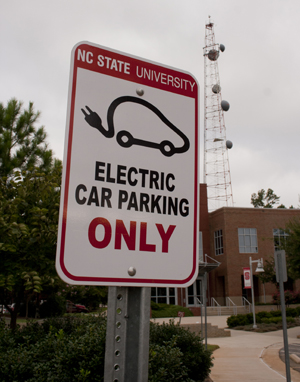Charging Ahead: NC State Provides Free Charging Station For Electric Vehicles
Matt Shipman – News Services
Reposted with permission.
 Demonstrating its role as an area leader in promoting new technologies, North Carolina State University has installed the first Level 2 charging station for electric vehicles in Raleigh. The station is available free for public use, though those who use the station will be asked to sign a log book to help researchers collect user data.
Demonstrating its role as an area leader in promoting new technologies, North Carolina State University has installed the first Level 2 charging station for electric vehicles in Raleigh. The station is available free for public use, though those who use the station will be asked to sign a log book to help researchers collect user data.
The station, which is already up and running, is located at the E. Carroll Joyner Visitor Center (JVC) on Varsity Drive near the intersection of Western Boulevard on the university’s Raleigh campus. A second charging station will be in place by the end of this month.
Level 2 charging stations – which use a dedicated 220/240 volt, 40 amp circuit – are important because they will facilitate the use of plug-in electric vehicles (PEVs) that will be coming on the market in spring 2011. “We’re helping build the infrastructure to make electric vehicles a reality in North Carolina,” says Stacy Fair, director of the JVC. The Level 2 station can also be used to charge Level 1 vehicles, which utilize a conventional 110/120v, 20 amp outlet.
The JVC station is funded by a Clean Fuel Advanced Technology grant from the North Carolina Department of Transportation and the North Carolina Solar Center at NC State. The grant, awarded to the JVC and the College of Education’s Department of Mathematics, Science and Technology Education (MSTE), is under the direction of Stacy Fair and Dr. Bill DeLuca, associate professor of MSTE.
The grant is also financing the purchase of a van that has been converted into a PEV. Scheduled to be in place by the end of September, the van will be on display for campus visitors and will be used for some campus tours. “The van will provide an energy efficient means of supplementing the buses that are currently used for daily campus tours,” Fair says.
But Fair stresses that the van will also support research, education and outreach purposes. DeLuca will coordinate efforts to demonstrate sustainable technologies to North Carolina schools and to foster student interest in science, technology, engineering and mathematics. The research on the charging stations’ usage and the van’s performance will be conducted in collaboration with the NSF Green Research for Incorporating Data in the Classroom project.
- Categories: